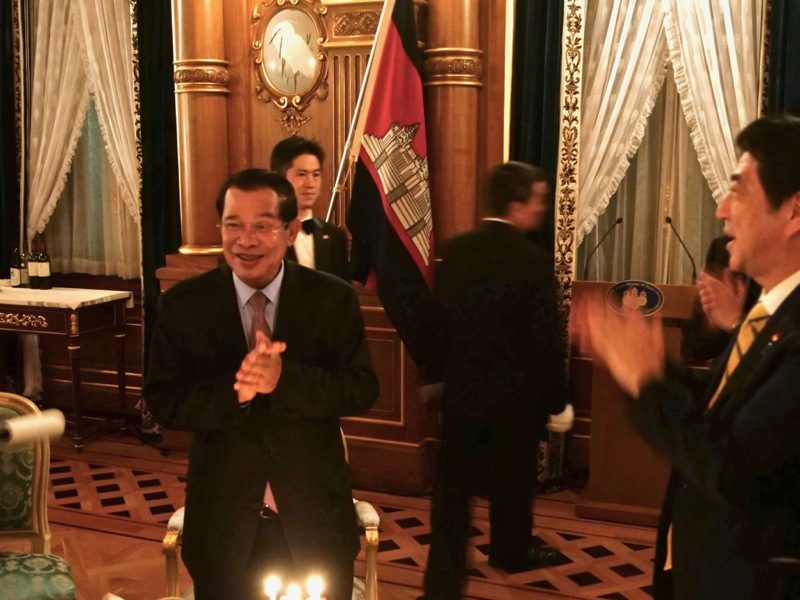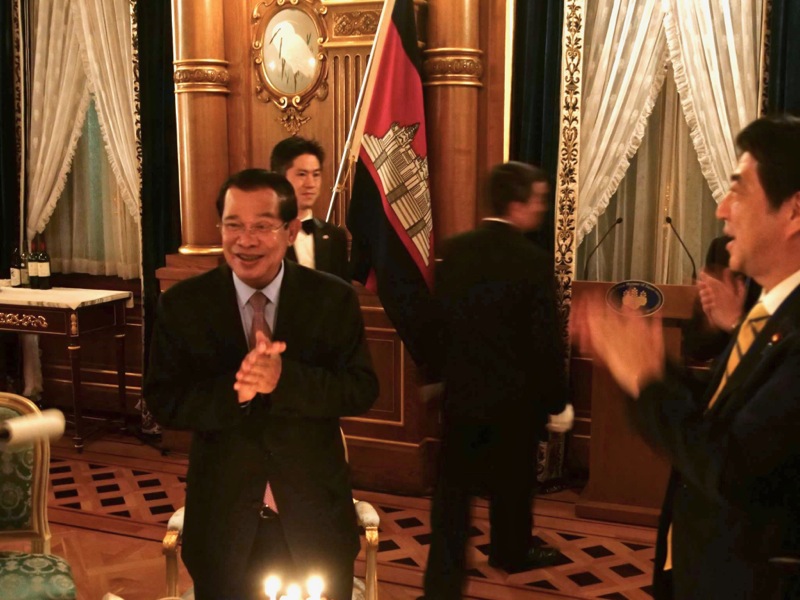Prime Minister Hun Sen on Tuesday told Japanese investors that he would “guarantee peace, security and a stable political situation” despite next year’s looming national election, ahead of which the premier has ratcheted up threats and intimidation of opponents.
Japanese Prime Minister Shinzo Abe in turn emphasized the upholding of democracy, human rights and the rule of law in a statement to the Cambodian people.

Asked whether Japan’s development assistance to Cambodia—some $3.4 billion from 1992 to 2015—has ever been conditional on the Cambodian government’s upholding of values mentioned by Mr. Abe, a representative of the Japanese Embassy in Phnom Penh said Japan’s position was that criticism alone would not improve the situation.
“We worked closely with Cambodian authorities to support their efforts for the better life of its people,” said Kaori Tanabe, the embassy’s first secretary.
The premier, who arrived in Japan on Sunday for a visit during which he and Mr. Abe signed agreements on Japanese foreign assistance to Cambodia worth more than $240 million, told attendees at an investment workshop in Tokyo that Cambodia was a safe bet.
“Even though the national election is coming up, there is no need to worry,” Mr. Hun Sen said, referring to next July’s national vote. “On behalf of the government, I guarantee peace, security and a stable political situation.”
Cambodia’s last national election in 2013 was contested by the opposition party and included widespread protests and a crackdown by authorities.
Mr. Hun Sen told the audience in Japan on Tuesday that he would continue his efforts to grow the nation’s economy, highlighting trade with Japan.
“I would like to appeal to the investors who have not yet come to Cambodia. Please come to study Cambodia’s potential before making a decision,” he said.
In the statement from Mr. Abe, issued on Tuesday by the Japanese Embassy in celebration of the 50th anniversary of Asean’s founding, Mr. Abe said his nation and the Southeast Asian bloc were indispensable partners “for peace and prosperity.”
“I am convinced that JapanAsean relations in the next 50 years would be bright if we could continue to cooperate while firmly upholding common values such as freedom, democracy, human rights and the rule of law,” Mr. Abe said in the statement.
Cambodia, an Asean member, is regularly criticized by national and international observers for its record on human rights and the rule of law.
Ms. Tanabe said Japan was providing help to Cambodia to improve the quality of the legal system through the development of lawyers’ capacity, and “further enhancing democracy” by supporting electoral reform.
“Especially, the strengthening of governance is necessary to achieve the sustainable society in Cambodia,” she said.
Miguel Chanco, lead Asean analyst for the Economist Intelligence Unit, said Japanese investment in the region typically had two angles: economic and political.
“On the former, Cambodia remains an attractive prospect in the near term for low-end manufacturing, especially those operations that are shifting out of China,” Mr. Chanco said in an email. “On the latter, Cambodia represents just another battlefield in the region where China and Japan are competing for influence via economic means.”
Stephen Higgins, managing partner of Mekong Strategic Partners, said in a message that Japanese firms were attracted to Cambodia’s open and high growth economy, which averaged about 7 percent GDP annually since 2011, before dropping slightly below 7 percent last year, according to World Bank data.
Japanese investors typically put their money in high quality, productive assets, unlike some countries that invest in “unproductive property investments, or infrastructure which may be important, but isn’t high quality,” he said.
“We’ve seen quite a bit of Japanese FDI [foreign direct investment] over the past decade, and it’s encouraging because Japanese FDI is about the best there is,” Mr. Higgins said.
In 2015, Cambodia netted more FDI as a percentage of GDP—9.4 percent—than Vietnam, with 6.1 percent, and Thailand, with 2.3 percent, although Cambodia ranked lower than both nations when it came to the ease of doing business, according to the World Bank.
Mr. Higgins said Cambodia was a “very attractive investment destination,” but many people weren’t aware of the relative positives.
“Cambodia’s reputation still isn’t as good as the reality,” he said.




